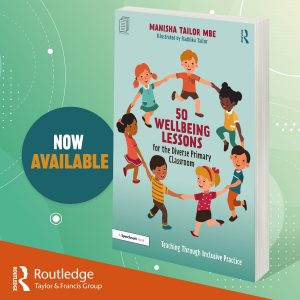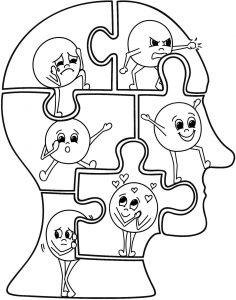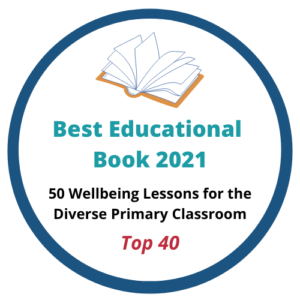
Manisha Tailor, MBE (BA Education, 2001) recently published her teaching resource, ’50 Wellbeing Lessons for the Diverse Primary Classroom: Teaching through inclusive practice’.
_________________________________________________________________________________
 Teaching about wellbeing through inclusive practice is about ensuring that all young people feel like valued members of their school community and beyond. It is about ensuring that all those who have a duty of care and commitment to the welfare and safety of children demonstrate responsibility in making sure mental health and wellbeing are at the heart of school ethos and culture.
Teaching about wellbeing through inclusive practice is about ensuring that all young people feel like valued members of their school community and beyond. It is about ensuring that all those who have a duty of care and commitment to the welfare and safety of children demonstrate responsibility in making sure mental health and wellbeing are at the heart of school ethos and culture.
Learning about mental health must be developmental, and for young children, rehearsing ways of asking an adult for help, persevering, and showing resilience if they find something difficult, lays the foundations for confidently accessing sources of support when they are older.
There is a growing mental health crisis in schools and mental health problems affect children in every country across the globe. This pandemic is changing the lives of people, including the lives of children all over the world.
A recent study by the Mental Health Foundation UK found that young people are feeling more anxious, a trend which is 10% higher for Black and mixed heritage children. Research from the World Health Organisation suggests that 1 in 8 children have a diagnosable mental health disorder and globally, depression is one of the leading causes of illness and disability. Furthermore, in 2017, suicide was the most common cause of death for both boys (16.2% of all deaths) and girls (13.3%) aged between 5 and 19.
How can we impact learning based on what we know?
 Mental health is also very closely linked to poverty, discrimination, and overall health and wellbeing. Teaching through inclusive practice is designed to support teachers in promoting social and emotional wellbeing within a diverse classroom, inclusive for all learners. Children will experience lots of highs and lows and at times in rapid succession. They will go through situations that make them feel excited, exhilarated, and happy, to sad, disappointed, and frustrated, caused by a change in environment, missing friends, bereavement, or change in circumstance e.g. parents’ loss of job and income as a result of the pandemic.
Mental health is also very closely linked to poverty, discrimination, and overall health and wellbeing. Teaching through inclusive practice is designed to support teachers in promoting social and emotional wellbeing within a diverse classroom, inclusive for all learners. Children will experience lots of highs and lows and at times in rapid succession. They will go through situations that make them feel excited, exhilarated, and happy, to sad, disappointed, and frustrated, caused by a change in environment, missing friends, bereavement, or change in circumstance e.g. parents’ loss of job and income as a result of the pandemic.
This rollercoaster of emotions can cause emotional suffering leading to poor self-care, personality change, and withdrawal. It is therefore important that children are given the opportunity to reflect upon the ways in which they can control, regulate and self-manage their emotions and recognise their impact on others.
Children learn morals, values, and beliefs from their family, peers, teachers, the media, and others around them. The influence from this socialisation informs their view of the world and their view of others. This can lead to stereotypes and prejudiced views of individuals and groups of people. The way in which they treat others as a result of these views can have an impact on the emotional health of the victim. This could include racism, disability discrimination, or homophobic abuse.
Our detailed lessons plans and supplemented resources help to promote discussion with each lesson plan containing learning outcomes, activity descriptions, and further questions to stimulate critical thinking, especially around areas of diversity specific to race, culture, and LGBTQ+. The content covered in this resource includes topics such as the psychological impact of discrimination, the Black Lives Matter movement, Islamophobia, disability, prejudice, coping with loss, feeling left out, moving school, and managing as a young carer.
The message is simple and clear – representation matters if our young people are to grow as independent, resilient, life-long learners, equipped to manage the adversities that life presents.
We want to be able to provide young people with the opportunity to explore their feelings and understand empathy and reflect, ask questions, analyse and find solutions through open discussion and collaboration on the things that matter to them. Helping children to reflect, feel comfortable to ask questions, and most importantly, feel as though they can talk about their feelings and emotions, without fear of judgment will lead to improved mental wellbeing.
Preparing children for the complexities of life in an ever-changing world will help them to develop resilience and adaptability as 21st-century life-long learners.
 ’50 Wellbeing Lessons for the Diverse Primary Classroom’ is available via Amazon, Waterstones and WHSmith.
’50 Wellbeing Lessons for the Diverse Primary Classroom’ is available via Amazon, Waterstones and WHSmith.
References: Samaritans | Mental Health Foundation | Mental Health Organization